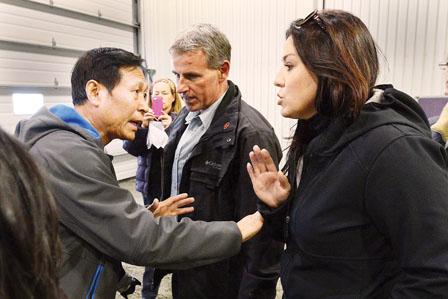空手一方客
收獲了一種恬靜的生活, 像一條波瀾不驚的小河, 流過春夏 流過秋冬現在,加拿大總理新聞辦公室和中國環球時報駐加記者之間的“爭拗”仍在繼續。為什麽會發展到這一步,總理新聞辦至於這般千方百計地阻撓李來提問嗎?問題就是:李學江的問題戳到了哈帕保守黨的痛處,因為他們根本不敢再批準任何一個大的投資案給中國的任何企業。所以他的新聞辦隻好不擇手段,連西方號稱的“公開公正”的假麵具都不要了,再醜惡無理,也要阻攔李的發言。
如此目的,隻能讓事情的發展適得其反。現在人人都知道了,哈巴的開發大西北隻是走走秀,喊口號,拉拉民意而已,他根本就沒有能力去開發。本來,他也沒想去開發。
什麽叫弄巧成拙,這就叫。什麽叫虛偽,這就叫。如果你不相信天下的政府都一樣,在很多大的問題上都是一手遮天,欲蓋彌彰,瞞天過海,隻能說,那是你還沒真正地領教過。
先來回放事件:
8月23日。哈巴每年夏天到北極轉一圈。當天到最後一站:魁北克省的最西北的小鎮Raglan Mine。按通常慣例,最後一站,總理之行要給隨行的18個記者(和總理坐的都是同一架飛機)開個記者會,一般容許5+1發問。5個給(合法的,即批準的)隨行的5個媒體,1個給當地的媒體。
這一次當地沒有媒體參加,決定6個問題都給隨行的媒體。隨行的記者們,集中了6個問題和6個提問人名字,交給了了新聞辦。其中就有環球時報的記者李學江。接著,總理新聞辦說,隻可以提5個問題。新聞辦的秘書Julie Vaux去跟排在提問者隊伍裏倒數第二的李學江交涉,希望他不要提問題。因此發生了媒體說的推搡。
記者獲準提問又被拒
哈珀總理此次北極之行,隨團隨機的記者共18人,其中隻有兩位外國記者,就是《人民日報》駐加首席記者李學江(以環球時報的名義出席這次),和新華社駐渥太華首席記者張大成。
在為期6天的行程中,哈珀每到一處,除視察外,都會發表一篇政策演講,然後是記者提問時間,但沒有一次給中國記者提問。
最後一天中午到達魁北克省最北部的拉格蘭鎳礦,在哈珀即將發表講話前,隨行記者團討論提問的事。李學江說,總理一路上強調開發北極資源,但一直沒講錢從何來;是否請哈珀總理澄清一下政府對外國國有企業投資的政策與法規。記者們都說這個問題很好,很重要,於是將李學江的問題納入到了提問名單,將總共6個問題及提問人名字提交給總理辦主持提問的新聞室副主任Stephen Lecce。
剛有兩個記者完,第三個記者提問之前,總理辦秘書Julie Vaux來到排在提問隊伍裏的李學江旁邊,把他拉出提問記者隊伍之外,給他說:希望你放棄提問。該問題可由一加拿大記者代為提出。李學江質問她:為什麽?這是一個中國視角的問題,換他人來問對中國記者不公平。因此李表示不同意。
到了第三個人提問完,Julie再次來到排著隊的李學江旁邊,拉著他的胳膊將他拉出隊外。為此,李非常生氣,便將她拉自己的手推開,這就是當地媒體報道的所謂“發生了推拉場麵”。
這時,李學江以為該輪到自已提問了,就在抓起話筒,準備提問時,Julie示意舉話筒的人把話筒從李的手中抽走,並來了兩位皇家騎警,將李學江拉扯到會場後方。
總理辦要求記者道歉
事後,李學江首先對發生這樣的事件表示遺憾;同時向同行們表示,希望他們不必報道這個插曲,淡化此事。
但旋即有記者發現,當天23日1:09PM,總理辦新聞室主任Andrew MacDougall從渥太華通過推特就此事發布了聲明。聲明說:“不論是否同意活動的安排與運作方式,對李先生來說,沒有借口同總理辦的工作人員發生肢體接觸(get physical with); 李先生應該立即道歉。” “We’ll be raising the matter with the Press Gallery, and Mr. Li should apologize immediately,” the PMO’s communications director, Andrew MacDougall, tweeted later. “Agree or disagree with how things are run, there was no excuse for Mr. Li to get physical with our staff.”
對此,李學江認為,應該道歉的是總理新聞辦。加拿大是一個民主國家,無任何理由突然剝奪一個記者提問的權利。這是對中國記者的歧視與不公。李學江當日夜裏回到家中脫衣時發現,左上臂因被皇家騎警拽扯用力過大而出現數處淤青傷痕,李學江對此保留控訴權利。
李學江要求總理辦道歉
事後,李學江在接受記者采訪時表示,他認為自己是按有關規定加入到提問記者名單中的,總理辦新聞室突然在現場作出撤換改變,未經記者團和他本人的同意,也未給出任何理由,這隻能解釋為是對中國記者的排擠與歧視。
他指出,在西方國家,記者具有無可置疑的提問權利,總理或總統也有裝做聽不見不予理睬,或是回避問題,或是顧左右而言它的權利。但無論是總理新聞室,還是警察都沒有因為記者要提問而動用武力將記者押離的權利。他還指出,不在現場,遠在數千公裏之外的總理辦新聞室主任,在沒有任何調查的情況下,即匆匆發貼對李學江進行指責並要求道歉,顯然是極不負責任的。
加國華人媒體為此采訪當事人:
8月29日,加拿大華文媒體記者就此采訪事件當事人,雙方均表示堅持要對方道歉,目前仍處於僵持狀態,下周或有進一步行動。
電話聯係到渥太華的李學江時,他表示自己目前工作很繁忙,衝突事件沒有影響他的正常采訪工作,但下周可能會采取進一步行動,向國會記者團(The Parliamentary Press Gallery)正式發信,要求總理辦向他道歉。
而總理辦新聞室主任麥克杜格爾(Andrew MacDougall)對華文媒體說,總理辦在推特上要求李學江道歉的立場沒有改變,在李沒有道歉之前,他拒絕任何評論。
總理辦公室官員與中國《環球時報》(Global Times)記者因采訪發生糾葛,雙方在電子郵件中繼續爭拗。總理辦官員要求中國記者道歉,否則禁止他參加總理出席的活動,對方則稱,總理辦需要先向他道歉才對。
《環球時報》報道,8月23日《環球時報》特派記者李學江在加國總理哈珀赴北極地區視察時,因為總理辦新聞官毫無理由地臨時要求中國記者放棄提問,隨後還叫來皇家騎警,將記者強行拉離提問隊列,導致李學江與總理辦新聞秘書朱莉發生「推拉事件」。
通訊總監發電郵要李公開道歉
然而這一事件尚未就此結束,總理辦通訊總監麥克杜格爾(Andrew MacDougall)仍然在給李學江的郵件中要求記者公開道歉。李學江對此予以堅決駁斥,雙方在郵件中再次展開交鋒。
8月27日晚,麥克杜格爾發電郵給李學江稱,「如果你不推我的工作人員並試圖奪走麥克風,這件事就不會發生。我等待你的道歉。」
當晚,李學江回覆道:首先是你的同事走近並拉扯本人,要求本人放棄提問,記者這才用手推擋她的拉扯的。記者當時正站在提問記者隊列裏準備提問,怎麽會毫無理由地走出去「推拉」她呢?
李學江在電郵中寫道:「我是被記者團集體推選出來的提問記者之一,你的同事沒有剝奪我提問的權利,尤其是強行!你的同事首先欠我一個道歉。」
加新社和加拿大廣播公司的報道都顯示,就在提問順序快要輪到李學江時,新聞秘書朱莉卻兩次前來拉李學江出隊,未作任何說明,就要求中國記者放棄提問,還曾建議將提問權讓給加方記者。李學江沒有同意,當她再度拉扯李學江出列時,李學江才將她「推開」。

李強調沒「推開」女新聞秘書
李學江在給麥克杜格爾的電郵中指出,「我想,你在發出指摘我的信件之前,根本沒有也沒有時間核實事實,因為當時記者都在發稿室采訪本人」,「我並沒有『推』過朱莉女士,我隻是想把她抓?我的手推開。你找不到任何我推朱莉女士的理由,當時我正在準備提出我的問題,你說我這個時候去推朱莉女士是完全不符合邏輯的。」如果你不清楚事件發生的過程,「現場有一位女士見證了整個事件。她的名字叫珍妮絲·考利」。
這名女士寫道,「我看到這個男人在排隊等候,然後一名女子走來同他說了些什麽,她試圖推走他,然後他就回推了,你們能看到他在問『為什麽』,然後就推拉起來。那名女子是肇事者。總理和加拿大人都應該向中國記者道歉,因為這將我們加拿大的民主變成了偽善。」這段評論是加拿大廣播公司(CBC)8月23日題為《在哈珀活動上扭拉之後,加拿大皇家騎警製止中國記者》文章後麵的跟帖。
李學江告訴麥克杜格爾,「記者對總理北方之行發回的4篇報道和1篇評論,加上19張照片都是正麵報道,並不負麵也不吹毛求疵。它們都有助於提升加拿大在中國的良好形象和聲譽。而這正是你作為總理辦公室官員的份內職責所在」。
針對麥克杜格爾說他與其他記者了解了情況的電郵,李學江指出:那為什麽他們都不站在你這一邊呢?正相反,他們的報道都批評了總理辦公室限製及不尊重媒體及記者。
李學江質問道:難道你沒有讀《環球郵報》和《國家郵報》第二天的新聞報道嗎?難道你沒有看當晚加拿大廣播公司與加拿大電視台的新聞嗎?難道你沒有看到在這些報道後麵的數以千計的讀者們的跟帖評論嗎?」
李問是否代表總理 麥隨即收聲
麥克杜格爾在最後的電郵中稱:「如果你不作出道歉,在總理的活動中你不受歡迎。」
李學江則在電郵中質疑麥克杜格爾這個表態是否能夠代表加國總理,如果真的能夠,要求麥克杜格爾以總理的名義向公眾,以及向中國駐加拿大大使館,尤其是要向議會記者中心發一個公告。
麥克杜格爾對此不再作聲,隻是說:「直到你發布公開道歉聲明,我不會再回覆你的任何通信。」
李學江在電郵中說:別指望我會道歉;我隻要求你回答一個極簡單的問題:臨時剝奪一位中國記者的提問權利的真實原因到底是什麽?因為這是發生此次不愉快事件的最根本的起因。但麥克杜格爾對此始終避而不答,拒絕回答為什麽不許隨行的中國記者提問的原因。
加國本土主要媒體幾乎都站在李學江一邊
加拿大《國家郵報》認為總理辦公室的這一舉動「並非意外」,因為此類官方與媒體的衝突在加拿大國內已司空見慣,意外之處是,「這種事件落在國際媒體頭上尚屬首次」。
總理記者會上發生的這一衝突事件成為加主流媒體關注的新聞。事發第二日,加拿大全國最大的報紙《環球郵報》(Globe and Mail)在其第四版最上方刊出了兩位加皇家騎警拉扯中國記者李學江的巨幅彩色圖片,並在其下麵配發了約2000字的相關報道。另一全國性大報《全國郵報》(National Post)同樣在其第四版刊出了約2000字的相關報道,下麵配發了同一幅黑白照片。加拿大兩大全國性電視台CBC和CTV,都在事發當晚將此事作為重要新聞事件播出。
這一事件在加拿大也引起了民眾的廣泛關注。有加民眾在網上留言,表示聲援中國記者,認為該道歉的應該是總理總理辦。一位名為“Ken Tone”的網友說:“哇!你們真會瞎說,哈珀拒絕回答問題,而你卻讓記者道歉。你們瘋了吧。”
最重要的是一位現場女聽眾的證詞:有一位名叫Janice Cowley的現場女聽眾站了出來作證,她寫道:“我看到的可不是這樣(指新聞室對李的指控)。我看到那個人(李)排在(記者)隊裏,這時一位女人過來對他說了些什麽,並且試圖推他走開,所以他才回推了她。我可以聽到他在問‘為什麽’,於是才發生了推拉。她才是肇事者。總理應該向李道歉,然後是向全體加拿大人(道歉),因為這將我們的民主變成了偽善。李說得好‘總理新聞室不應剝奪我(提問)的權利,這不是民主’。”
有媒體披露說,總理辦對媒體素來態度傲慢,無論是加通社、《環球郵報》還是《全國郵報》,都在報道中提到總理新聞室對記者的不尊重。《環球郵報》在報道中寫道,“自保守黨當選以來,加拿大媒體同總理辦人員的關係緊張已經司空見慣。”
相關鏈接:李學江簡曆
李學江,吉林省榆樹市人,為人民日報社高級編輯,曾任人民日報駐美國首席記者。李學江先是在中國人民解放軍海軍北海艦隊服役;後畢業於中國社會科學院研究生院新聞係和英國布拉德福德大學和平研究係。1995年至2002年李學江任人民日報駐澳大利亞首席記者;2002年至2005年在人民日報國際部從事國際評論工作;2005年8月出任人民日報駐華盛頓記者站首席記者,其後出任駐渥太華記者站主任兼首席記者。他的另一個身份是人民日報社旗下《環球時報》的加拿大特派記者。
“推拉事件”現場視頻:
http://globalnews.ca/news/798660/harpers-northern-tour-ends-in-tussle-with-chinese-reporter/
加拿大CBC電視台的報道 (08-23-2013):
Canadian media offered up slot
As is now common practice at Harper news conferences, the number of questions is decided by the prime minister’s staff and announced to members of the media, who determine by consensus which issues need to be addressed and which reporters are best to pose them.
Political reporters have long complained about the practice, but Harper’s office for years has refused to do things any other way.
On this trip, the prime minister’s deputy director of communications, Stephen Lecce, changed the established practice and instead alternated which reporters he would call upon — one group the first day, the remainder the next.
The two Chinese-language reporters on the trip did not ask for questions until Friday.
In advance of Harper’s news conference at Raglan Mine, reporters were told they would get either four or five questions in English. On this trip, the fifth question has gone to a reporter from the local media. There were also one question reserved for French-language media
In the absence of a local reporter, reporters agreed the fifth question in English should go to Li. He wanted to ask about foreign investment in Canada's natural resources sector. But Lecce said in the absence of a local reporter there would be only four questions allocated, though he offered to see if a fifth would be allowed.
Among themselves, the travelling media agreed Li should have a chance to quiz the prime minister on a topic that mattered to his readers and would provide the rest of the reporters with potentially useful material.
“I wanted to clarify the federal government policy and the regulations toward foreign state-owned company investment,” Li said later.
The other media members offered to dump one of their questions so Li could ask his. At first it seemed that plan would be acceptable. In fact, Li said Lecce asked him his name in order to add it to his list.
In the end, Lecce stuck to four questions in the alternating format and refused to allow Li to occupy a slot voluntarily vacated by a Canadian reporter.
最重要的是,當地在場的聽眾Janice Cowley的證詞:






"A dictator is a ruler who does not rule through democratic means.
In modern usage, the term "dictator" is generally used to describe a leader who holds and/or abuses an extraordinary amount of personal power, especially the power to make laws without effective restraint by a legislative assembly[citation needed]. Dictatorships are often characterized by some of the following traits: suspension of elections and of civil liberties; proclamation of a state of emergency; rule by decree; repression of political opponents without abiding by rule of law procedures" Sounds about right, how did we get to This? Harper need to Go! “